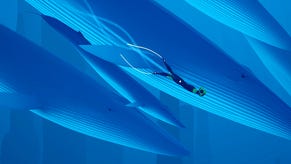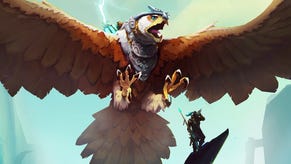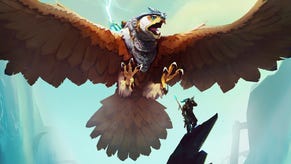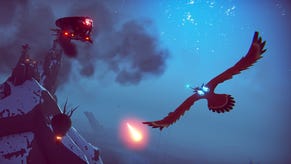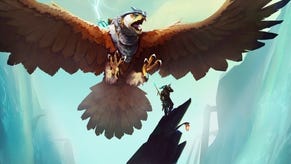The Falconeer is absolutely majestic
H is for Heck, Yes!
We're taking Rezzed online over the next few days, presenting sessions and bringing you highlights of what's new and interesting in the world of independent games. You can find more details on exactly what's going on over here, and we'll be bringing you more write-ups over the coming days.
Look at this world! When the clouds roll in, when the sun ignites the tips of the waves that roll and thunder and boom underneath you. Look at this world, when you arc in close to an island freshly delivered out of the mist and you see rickety bridges, broken temple spires, bundles of sticks lost to the froth and surf. Look at this world when you race up and the sky is everywhere, shifting from pearly dawn to burning dusk. Look at this world when you scud over the top of breakers and a whale erupts from the water and splashes back into the deep.
Before I play The Falconeer, I have a half hour chatting to its pretty-much-one-man-developer Tomas Sala over Skype. He looks breezy for someone who's just had a baby. In fact, perhaps breezy isn't quite right. There is a glorious mania here as he tells me about his last few weeks, but also about the world he is making in a back room filled with baby toys, about the bird he has made and the landscape it travels through. Cultures! Factions! Lore! I'm a lore guy, he says, and I believe it. He wants to show me the basics of this game, which is an aerial dog-fighting RPG affair set in a richly detailed fantasy world. But he also just wants to talk about what he's doing, I think. This game! This game is made of love. It is so obvious. Everything he tells me reminds him of something else he wants to tell me. Characters. Missions. Mechanics. Nested campaigns! A map of a world that takes a long time to travel across! The politics and customs!
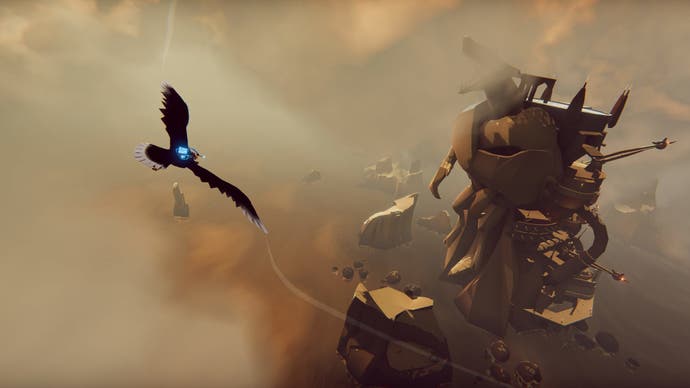
This is what I love too, of course. A game that comes from a place of sheer passion. And when I play the build myself - a starter island, make a character, get up into the sky! - that passion is everywhere in the detailing, the extraneous flourishes, the sense that one thing leads to another and to another and there is no end to the invention.
But the basics! In The Falconeer you are a falconeer. You sit on the back of a huge bird of prey as you explore a steampunky world that has been lost to rolling oceans. Little city-states prod through the waves every now and then, each building perched on a cliff, each string of lights between peaks suggesting a hardscrabble world. You take on missions, flying out across a huge, detailed map, to investigate lost buoys, to clear shipping lanes by picking up mines in your bird's talons and then dropping them elsewhere, to engage in blistering feathered combat against enemy falcons.
Movement is at the heart of it. It's ingenious. You earn energy by diving towards the earth. This fills up a blue meter that you can then spend on dodges and rolls and dashes, although hitting the waves will wipe it out. Aiming and shooting is a simple business, there's a nice highlight for enemies and you generally have a wingman who can be called on when battles get really sticky.
I've faced off against one bird or three or four, and then a bunch of 'em with attack ships rolling in the seas below. I'm promised airborne battleships and barges and all that stuff. It's frantic but precise, the way a dog-fighting game should be.
Everything is richness. You refill your electrical weaponry by flying through lightning storms - but too much lightning is too much lightning even in a world like this. You take on quests from fascinating characters and watch as their disdain turns to trust. You visit different places and see the different customs and values. Things emerge from the depths without warning. This world really does go on forever.
The Falconeer is special, I think. It's got that lovely thick fantasy art that reminds me of Torchlight, and at moments I get a Crimson Skies vibe as I'm zipping back and forth taking on missions and dipping low over the water to feel the spray. But most of the time it reminds me of nothing at all. Instead I aim for the sun and think of Tomas Sala, with his new baby, his room of children's nicknacks, and his computer screens on which a strange, vivid place is coming to life.
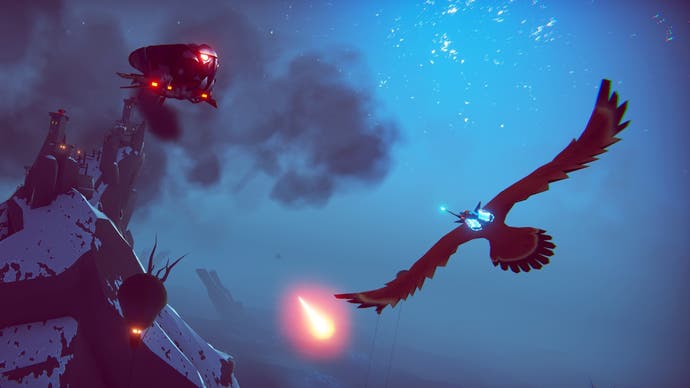


.png?width=291&height=164&fit=crop&quality=80&format=jpg&auto=webp)
